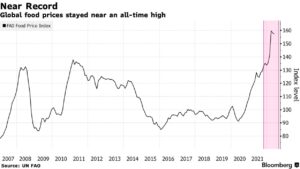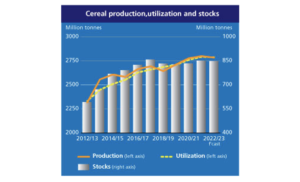President Donald Trump on Friday signed an executive order temporarily expanding the amount of beef the U.S. can import from Argentina, a move the White House says is aimed at…
World Food Prices Fall For Second Consecutive Month, But Still Near Record
Bloomberg writer Aine Quinn reported today that, “Global food prices stayed near a record as Russia’s invasion of Ukraine disrupted trade, fueling hunger and worsening a cost-of-living crisis.

“Russia’s invasion has sharply reduced exports from Ukraine, one of the world’s biggest grain and vegetable oil shippers. The blockade of key Black Sea ports has exacerbated supply-chain turmoil, sending prices soaring and prompting the United Nations to warn that food shortages may spur millions of people to migrate.
“A UN gauge of global food costs fell 0.6% in May from the previous month. Vegetable oil prices declined 3.5%, partly due to the removal of Indonesia’s export ban on palm oil, the UN’s Food and Agriculture Organization said.”
The Bloomberg article noted that, “The UN food price index soared 13% in March, its fastest pace on record, immediately after Russia’s attack, before declining slightly in April as demand for vegetable oil fell and corn prices weakened.”
Also today, Reuters News reported that, “World food prices dipped in May for a second consecutive month after hitting a record high in March, although the cost of cereals and meat both rose, the United Nations’ food agency said on Friday.”
Despite the monthly decline, the May index was still 22.8% higher than a year earlier, pushed up in part by concerns over the impact of the Russian invasion of Ukraine.
The Reuters article noted that, “In separate cereal supply and demand estimates, the FAO said it expected global cereal production would drop in the 2022/23 season for the first time in four years, easing 16 million tonnes from record 2021 levels to 2.784 billion tonnes.”

And Dow Jones News writer Yusuf Khan reported today that, “In terms of cereals, the index averaged 173.4 points in May, up 3.7 points from April and as much as 39.7 points above its May 2021 value, led by rising wheat prices.
Wheat prices rose for a fourth consecutive month, up 5.6% in May and just 11% below the record high reached in March 2008, the UN body said.
“This was led by India’s wheat export ban and uncertainty around Ukrainian exports.”





